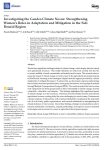Mazhoud H., Boucif A., Ouhibi A., Hajji-Hedfi L., Chemak F. (2025). Investigating the gender-climate nexus: strengthening women's roles in adaptation and mitigation in the Sidi Bouzid Region. Climate, 01/08/2025, vol. 13, n. 8, p. 164.
https://doi.org/10.3390/cli13080164
https://doi.org/10.3390/cli13080164
| Titre : | Investigating the gender-climate nexus: strengthening women's roles in adaptation and mitigation in the Sidi Bouzid Region (2025) |
| Auteurs : | H. Mazhoud ; A. Boucif ; A. Ouhibi ; L. Hajji-Hedfi ; F. Chemak |
| Type de document : | Article |
| Dans : | Climate (vol. 13, n. 8, August 2025) |
| Article en page(s) : | p. 164 |
| Langues : | Anglais |
| Langues du résumé : | Anglais |
| Catégories : |
Catégories principales 07 - ENVIRONNEMENT ; 7.6 - Changement ClimatiqueThésaurus IAMM CHANGEMENT CLIMATIQUE ; GENRE FEMMES HOMMES ; ROLE DES FEMMES ; ADAPTATION AU CHANGEMENT ; ZONE RURALE ; AGRICULTURE ; SIDI BOUZID ; TUNISIE |
| Résumé : | Tunisia faces significant challenges related to climate change, which deeply affect its natural and agricultural resources. This reality threatens not only food security but also the economic stability of rural communities and mainly rural women. This research aims to assess the impact of climate change on rural women in the agricultural development group in Sidi Bouzid, focusing on the strategies adopted and the support provided by various stakeholders to mitigate this impact. To achieve this, we developed a rigorous methodology that includes structured questionnaires, focus group discussions, and topological analysis through Multiple Correspondence Analysis (MCA). The results revealed that rural women were categorized into three groups based on their vulnerability to climate change: severely vulnerable, vulnerable, and adaptive. The findings highlighted the significant impact of climate change on water resources, which has increased family tensions and reduced agricultural incomes, making daily life more challenging for rural women. Furthermore, a deeper analysis of interactions with external stakeholders emphasized the important role of civil society, public organizations, and research institutions in strengthening the climate resilience of rural women. Given these findings, strategic recommendations aim to enhance stakeholder coordination, expand partnerships, and improve access to essential technologies and resources for women in agricultural development groups. |
| Cote : | En ligne |
| URL / DOI : | https://doi.org/10.3390/cli13080164 |







